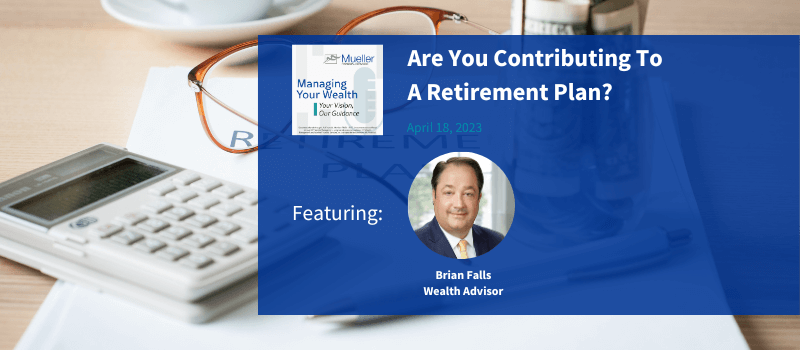
Podcast: Are You Contributing To A Retirement Plan?
By Mueller Financial Services, April 18, 2023
Join Wealth Advisor, Brian Falls, as he discusses considerations for contributing to a retirement plan. Mueller Financial Services can assist in the development of individualized custom plans as your situation and goals are unique.
For more information, please contact:

Brian Falls
Wealth Advisor
bfalls@muellersolutions.com
847.717.8347
Episode Transcript:
Retirement Contributions
[00:00:00] Ashley: Hi everyone, you’re listening to “Managing Your Wealth: Your Vision, Our Guidance,” the Mueller Financial Services Inc. podcast. I’m Ashley, and today I’m with Wealth advisor, Brian Falls to talk about retirement contributions. But before we begin, let’s do a quick introduction.
[00:00:19] Ashley: Brian is a Wealth advisor with over 27 years of experience in the financial services industry, working directly with individuals, retail, and professional clients. Brian takes pride in understanding his clients’ unique wants and needs and focuses strongly on helping them transform their financial future and pursue their personal financial goals.
[00:00:42] Ashley: Brian, thanks so much for joining us on the podcast today.
[00:00:45] Brian: Sure, glad to be here.
[00:00:46] Ashley: And with that, let’s dive right. What is the most important factor to consider when contributing to a retirement plan?
[00:00:52] Brian: I feel like there’s two that really stand out to me. The first is time. The earlier you can start, the better off you’ll typically going to be.
[00:01:03] Brian: I did some quick calculations, and let’s say you started at age 25. Planning on retirement at age 65. You started putting in $200 per month, and over that timeframe you earned an average of 7% rate of return. Now that’s gonna grow to around $528,000.
[00:01:24] Brian: Now if you just delay that five years to age 30 and still plan on retiring at 65, putting in that same amount only grows to around $362,000. That’s a pretty significant difference, about $165,000. In order to get back up to that $528,000, you’re gonna have to increase your savings amount per month.
[00:01:47] Brian: That’s a huge difference on five years, and people don’t realize that can make a big difference in the long run. It could delay your retirement or it could also increase the amount that you’re gonna have to save later. So I encourage people even if it’s not as much as you think you need to, start early and do it on a regular basis.
[00:02:09] Brian: Then the second thing I like to tell people is be consistent about it. It’s easy to say, well, I’ll do it later, or I’ll increase it later, or whatever. Do it consistently. I like to tell people do it automatically with every pay period.
[00:02:23] Brian: So each time you get paid, the money just automatically goes into an account. You learn to live without it, and you’re doing it consistently, and you’re not gonna have to worry about writing a check because it’s easy to say, I don’t want to send in the money this month because, I’ve got other bills or something’s come up so out of sight out of mind, automatic and consistent.
[00:02:45] Ashley: Which is better? An employer-sponsored plan or an IRA or individual retirement account?
[00:02:52] Brian: Of course each individual is gonna be different. But, an employee sponsored plan typically does offer some really good benefits. For example, an employer often matches a percent of your contribution. A popular one is 50% or 50 cents on the dollar for the first 6%, so that’s 3% of your income you could be putting in to an account that your employer is giving to you. So why do you want to not take advantage of that. Also with higher earning individuals, the employee sponsored retirement plan can also be very beneficial.
[00:03:32] Brian: IRAs in 2023, you can only put in $6,500 or $7,500 if you’re over age 50. Whereas with an employee sponsored plan like a 401k or a 403b, you can put in up to $22,500 or $30,000 if you’re age 50 and over. Along with that, on an individual retirement account, there’s what’s called phase out rates. As your income goes up, you may or may not be even allowed to put money into it. With their traditional IRA once you start into these phase outs, you can still put money into the traditional I. however, you might not get the tax break of being able to write that money off of your earned income for the year. Whereas with a 401k or 403b employer sponsored plans you should still be able to do that. Um, and with a Roth ira, once you reach a certain income level, you cannot contribute to that anymore.
[00:04:30] Brian: Employers are beginning to offer the Roth option with the 401k or 403b and that’s not gonna have any income restrictions, so that might be an option where you wouldn’t be able to do it any other way in a Roth.
[00:04:46] Ashley: What is the difference between a traditional and a Roth IRA?
[00:04:51] Brian: So a traditional, you’re getting the tax break up front. So let’s say I put $5,000 into an IRA or an employee sponsored plan. I can typically write that money off, and that just reduces my earned income for the year. So it’s $5,000 I’m paying, but it’s not really hitting me for $5,000 cuz I’m getting that break. There are some exceptions in there. So, you know, feel free to ask about that. The money will grow tax free and then whenever you go to retire after age 59 1/2, then you can withdraw that money, but that’s when you have to pay the taxes on it. So if I withdraw $5,000, I’m gonna have to declare that as earned income for the year.
[00:05:31] Brian: Eventually once you reach, 72, 73 years old, the law just changed this year. So it depends on when you were born, right at the moment, the government’s gonna force you to start taking required minimum withdrawals, from your traditional IRA. Now with a Roth IRA I put money into it after tax. So I’ve already paid the tax on that $5,000.
[00:05:52] Brian: It grows until I retire. After age 59 1/2, I can withdraw the money and I’m not gonna pay any income tax on that. Plus I’m never forced to withdraw money. So if I never need it, I don’t have to take it out.
[00:06:08] Ashley: My final question for you is, how much should I be contributing?
[00:06:12] Brian: So that’s an excellent question and there’s not an exact right answer on that. I encourage people to work with an advisor on that to really identify their wants and needs, to where they want to get to. When do you want to retire? How long do you have before that time comes up? What type of retirement do you want to have? Do you want to travel? Do you want a second home? What are your plans?
[00:06:37] Brian: Kind of get an estimate saying, okay, well I know that it’s cost me x dollar amounts to live. I think that’s probably reasonable. Work with an advisor or use some type of planning software that’s gonna calculate, inflation involved in that to say, okay if I need a million dollars, we’ll just use that as the big round number, to retire. How much do I need to save each month in order to get there?
[00:07:02] Brian: So keep those things in mind and then set a plan in place. Revisit it once or twice a year, and you can always adjust it. More is always better, right? So if you have more at the end, then you can spend, you’re gonna be better off and it’s gonna be hard to make it up later in life. Now, obviously you might have to make adjustments along the way. Of course you might have to do that that’s understood. However you know, getting started and being consistent is very important.
[00:07:30] Brian: And another feature that I like to encourage people to do is automatic increases a lot of programs with retirement plans through employers is you can set automatic increases. So every year, you know, let’s say you’re gonna get your annual raise, have it increased by 1%, that’s going into your 401k at that time.
[00:07:54] Ashley: Well, thank you so much for joining today’s podcast, Brian.
[00:07:56] Brian: Thank you, I hope you enjoyed it, hope it was useful.
[00:08:00] Ashley: And thank you for listening. If you’re interested to learn more about retirement contributions or more about Mueller Financial Services in general, visit muellerfinancialsolutions.com. You can also follow the firm on LinkedIn at Mueller Financial Services, Inc. for more firm updates, insights, and upcoming events.
[00:08:17] Ashley: Securities offered through LPL Financial member FINRA / SIPC. Investment advice offered through IHT Wealth Management, a registered investment advisor. IHT Wealth Management, and Mueller Financial Services Inc. are separate entities from LPL Financial.
[00:08:33] Ashley: The opinions voice in this podcast are for general information only and are not intended to provide specific advice or recommendations for any individual. To determine which strategies or investments may be suitable for you consult the appropriate qualified professional prior to making a decision.
Related Insights

June 21, 2023
FIRE Movement
ShareIf the idea of retiring in your early 50s, 40s, 30s, or even late 20s appeals to you, you may …
Read More navigate_next
May 30, 2023
What U.S. Expats Need to Know About Estate Planning
ShareAt least 12% of Americans have thought about living abroad in retirement, according to a study by the Aegon Center …
Read More navigate_next